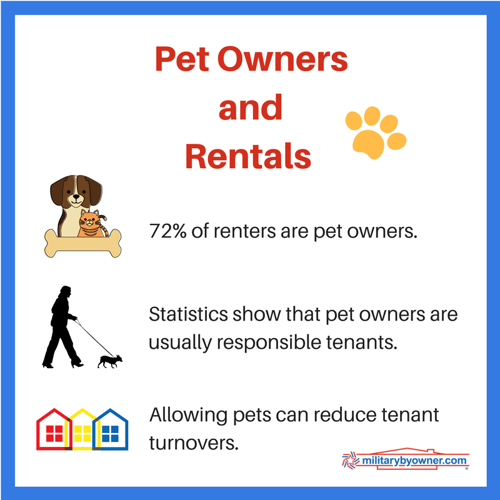Landlords, Should You Allow Pets in Your Rental Property?
Take a poll of landlords, and you'll find they often have mixed feelings about the presence of pets in their rental home. If you're a landlord or property manager, you've likely given some thought as to whether or not you'll allow your tenants to have pets. And if you’re catering to military renters, it’s especially important to consider.
Why?
A large number of military families move with pets, and will immediately bypass your property listing if you have a “no pets” policy. Allowing pets opens you up to a broader pool of tenants!
Many landlords observe that their properties rent more quickly when pets are allowed. Some say tenants are going to bring their pets anyway, so why fight it? In their view, it’s better to require a pet deposit upfront to offset any possible damages and have guidelines in place. Take a look at these facts:
- The Humane Society reports that 72% of renters own pets.
- Statistics show that, overall, pet owners make good tenants.
- Pet owners are more likely to renew a lease.

Benefits of Allowing Pets in Your Rental Property
1) You'll find a larger pool of renters.
The majority of U.S. households own at least one pet (66% of U.S. households, or about 86.9 million families), according to the 2023-2024 pet ownership and data survey from the American Pet Products Association (APPA). Compare this to the first year the survey was conducted (1985), when 56% of U.S. households owned a pet. Pet ownership is only growing!
2) Less rental turnover.
Pet owners are more likely to renew their lease, which means less tenant turnover for you.
From RENTEC Direct:
Another bonus for landlords who allow pets at their properties involves a reduction in tenant turnover. In an analysis of landlord surveys by FIREPAW, Inc., tenants with pets were found to stay significantly longer, by an average of 23 months compared to 15 months. This difference was found to be even greater using tenant surveys who reported staying an average of 46 months in pet-friendly compared to 18 months for tenants residing in rentals prohibiting pets.
 Photo from Shutterstock
Photo from Shutterstock
3) Pet-friendly properties can draw a higher rent.
Pet owners are loyal to their furry companions and often willing to pay more for a pet-friendly home. In addition, you can safeguard your property by adding "pet rent" or a pet deposit for any damages or wear and tear. A study from HotPads gives an example: pet-friendly units in San Francisco cost an average of 12% more than those that don't allow pets.
It's important to note that federal law prohibits charging pet rent for a service or assistance animal. (Keep reading to learn more about what's required of landlords in regards to service animals.)
 Photo from Shutterstock
Photo from Shutterstock
4) Statistics show that pet owners are usually responsible tenants.
Taking care of pets requires time and attention. Pet owners will more likely view your rental as their home and also give energy to taking care of the property. They also tend to be home more, which means added security.
Learn more: Pet Friendly for Better Tenants.
5) To support the military community.
Not only will you improve your reputation as a landlord, you'll also be supporting military families during a PCS move, which is a stressful event. Finding a home that allows all their family members, including beloved pets, removes one of those stressors immediately. And when they move on, they're likely to pass your name to other potential renters. It's a win-win!
Of course, only you can decide if it’s worth allowing pets in your rental property. If you don't want your tenants to keep pets, be sure to state this clearly in your lease. But if you do rent to pet owners, take a few steps to protect your property as well as understand your legal obligations.
Pet Requirements to Add to Your Lease
1) Require a pet fee.
Whether you call it a pet deposit, non-refundable pet fees, or a monthly “pet rent,” charge a reasonable fee to repair any damages or pay for carpet or other cleaning on move out.
Not sure how much to charge? Take a look at your local rental market to see what the going rate or deposit is for pet-friendly rentals. 
Photo from Canva
2) Add wording to your lease addressing your pet requirements.
Some important points to include:
- You may choose to approve dogs based on weight rather than breed. For instance, some leases allow dogs only under twenty pounds. You might also want to add wording for approval on a case-by-case basis.
- Whether or not you require proof of spaying/neutering.
- Require renters insurance. This will cover your tenants and you in the event of an accident or bite.
- Details on removal of pet waste. Stipulate that pet waste will be removed regularly and where it’s to be placed (for instance, in outside trash bins only).
- Require proof of current vaccinations and that cats and dogs are microchipped and wear tags.
- Behavior: that pets will be kept under control at all times or leashed when outside of a fenced yard.
- No animals allowed to be tethered or left outside, even in a fenced yard, in extreme temperatures or at night.
- Tenants are responsible for any damages caused by pets.
- Whether or not exotic pets are allowed, and what type.
Need more help with your lease terms? MilitaryByOwner’s partner, US Legal Forms, offers pet-specific addendums for rental properties.

Photo from Canva
3) Stipulate how many and what types of pets are allowed.
The number of pets you allow should make sense for the property size. As mentioned before, you might choose to limit exotic animals or certain breeds, but you can also require your tenant to seek approval and potentially sign a new agreement if any new pets are added. Also, if you plan to return to the home some day, you may want even tighter guidelines if someone in your family has a pet allergy.
Some insurance companies won’t issue renters insurance for certain dog breeds, so check with your insurance provider before deciding which pets to allow.
What about small pets or fish tanks? You may decide on a policy of cats and dogs only, and no exotics (lizards, chinchillas, rabbits, etc.) Even small animals can create damage if left out to roam, and large fish tanks can cause carpet damage or flooding issues.
Add wording to your lease along the lines of “tenant’s pets only” if you don’t want a tenant caring for extra pets on your property. Also include specifics about visitors’ animals, including if they're allowed, length of stay, and so on.
Photo from Canva
4) Understand what's required of landlords in regards to service animals.
Under law, landlords must provide "reasonable accommodation" for service or support animals. For more information, take a look at Avail's in-depth article on the topic of service animals and rental properties. You're required to comply with the Fair Housing Act as well as local and state laws. Check with the ADA site for the latest laws regarding service and emotional support animals.
The Department of Housing and Urban Development (HUD) provides further clarification on service and assistance animals to help housing providers understand their responsibility when it comes to reasonable accommodation.
5) Check your HOA's regulations.
Your homeowners association likely has rules in place regarding breed, types, and number of pets on your property. If you’re renting out a condo, there will certainly be regulations regarding pets, including noise that would disturb neighbors.
What recourse does a landlord if there are issues with a tenant's pet?
Whether it's an unauthorized pet, noise complaints from neighbors, or obvious signs of neglect, you as a landlord will need to become very familiar with your state and local law. Photographic evidence may be necessary, or you or your property manager may see something suspect during a routine maintenance call or regular inspection that requires action.
What to do in this scenario? While we can't give legal advice, barring a criminal act like animal cruelty or neglect which would need to involve either animal controlor law enforcement, a landlord would need to first provide a written notice of the lease violation and the timeline in which it needs to be remedied. If the violation isn't corrected, you may need to move forward with an eviction notice. Fines may be part of this process, as well as any fees for damages incurred. Learn more about the steps you can take in RentPrep's post, My Tenant Got a Dog Without Permission: Now What?
Many families consider their furry friends members of the family. By opening up your rental to pet owners, you can provide support to military families and also broaden your potential pool of renters.
Are you a landlord? Share your best tips regarding tenants with pets!








